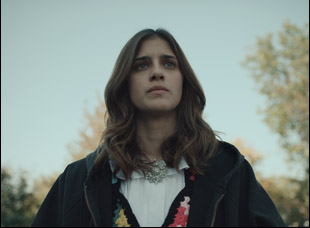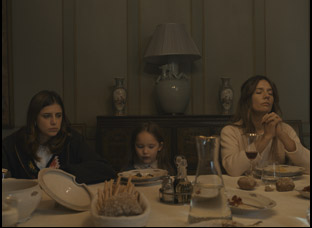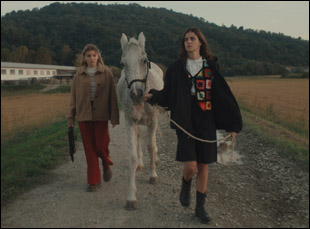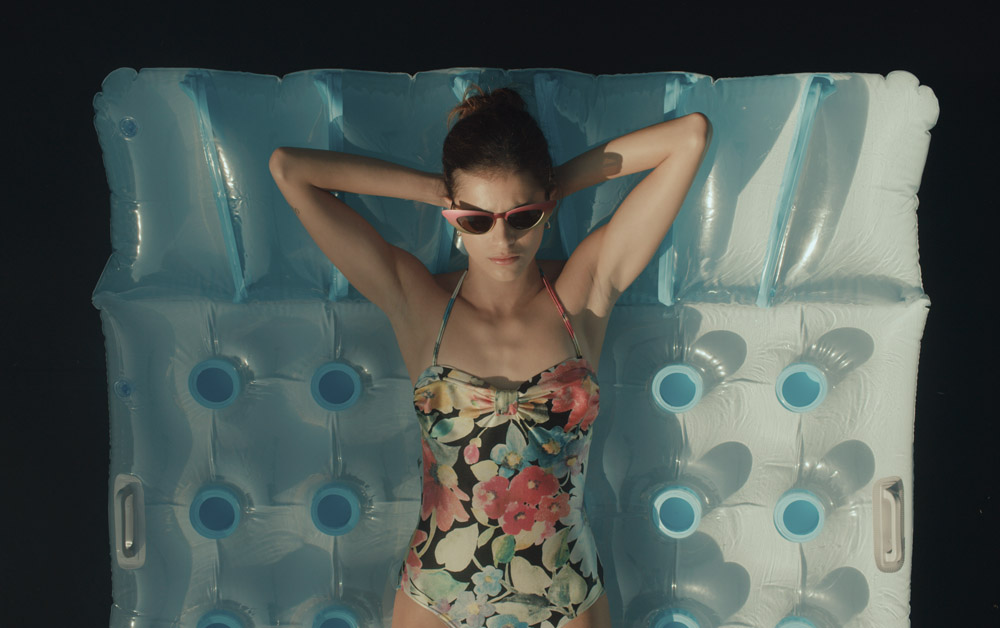It was on the last day of filming “Amanda” that Carolina Cavalli learned that she’d be welcoming an unexpected co-star onto the set of her feature debut. Sneaking past any parameters the production put up, the intruder might’ve been rushed off any other film that had been planned to a tee, but there was something about the wily squirrel that found its way into the frame that reminded Cavalli of her heroine, constantly in search of adventure, and she made sure to turn the camera in its direction.
“It was this amazing squirrel, and without post-production and without training, it just ran and stopped at the perfect time,” says Cavalli, still incredulous at her good fortune. “I was like, ‘Thank you,’ and [I thought] it’s a sign maybe this is going to go well. So we kept this spirit.”
To go by “Amanda,” there’s far more than luck at play when it comes to Cavalli capturing the elusive and downright magical in her marvelous comedy, a tale of a bored twentysomething paralyzed by her imagination in some ways when reality of her life, in which she comes from wealth that left her with plenty of time and largely without the challenges facing most of her peers, seems so much smaller. She’s found a way to travel without leaving home, with trips to the local cinematheque offering excursions to other worlds, befriending a horse for trips around town and checking into a motel to spend nights away from the decadent yet dilapidated mansion where she grew up and kill time by scanning ChatRoulette, less it seems for a potential personal connection than to simply peer into others’ lives. These seem like temporary salves for her restlessness, ultimately finding common cause with Rebecca (Galatéa Bellugi), the daughter of her mother’s friend Viola (Giovanna Mezzogiorno), though the two are skeptical of one another when introduced by their parents.
Amanda may suffer from a certain sense of aimlessness, but the film that bears her name is as sharp and on point as they come, disarming audiences as the character herself starts to open herself up to the people she’s closed herself off from as she’s chased excitement without believing it could be found looking directly in front of her. Still, she isn’t wrong to keep looking when Cavalli is able to find it in the every day so readily and Amanda’s enthusiasm for the smallest things becomes infectious. “Amanda” is just the first of two movies out in 2023 to suggest the emergence of a fiendishly brilliant filmmaker when Cavalli also co-wrote Babak Jalali’s sly Sundance comedy “Fremont” about a former Afghan interpreter who resettles in Northern California where she’s picked up a new gig writing fortune cookie messages. On the eve of “Amanda” arriving on U.S. shores after premiering last fall at the Venice and Toronto Film Festivals, Cavalli spoke about how any fears of making the transition of writing to directing where her creativity might be curtailed were quickly allayed, believing even those with the smallest amount of screen time have a lot going on in their lives and finding the film’s distinctive tone through working on the score at the same time as penning the script.

No, I didn’t even think I had the right personality to direct because when you’re a screenwriter, I don’t have to deal with people at all. I can organize my routine myself and I’m usually very calm in my routine, but I discovered that directing gave me so much adrenaline and an addiction to control details that maybe when you’re screenwriting, you cannot. It was really a great experience for me — and I loved reality. Usually I don’t like reality much, but in this case, it’s so helpful because it brings you to be even more creative because maybe there’s an obstacle you have to find a way to overcome with a better idea.
How did the character of Amanda first come to mind?
I started from the character, not from the plot, which is something that I really like to do if I can — to get to know the character and then to let them walk their way and follow them [to create the story]. But after shooting [the film], I realized that I was reading a lot of these children’s books like “Pippi Longstocking” or “Matilda,” or the French “Caroline” [series] and I imagined this little strong girl, and I [wondered], “How are they going to grow up? I hope they’re not going to become annoying or assholes.” I hope they’re going to keep something [from their youth]. I imagined Amanda would be my age — and actually, she’s a little younger than me — but that’s how I imagined them growing up, and it made me happy.
Did the other characters emerge from there?
Yeah, I imagined, “Okay, what Amanda needs right now?” And knowing her and her desires and fears, I [thought], she needs a friend for sure. But she’s not going to go for a friend immediately, she’s going to go [find] a fan, she’s going to go for a horse, and then the idea of Rebecca started from Amanda, because I imagined these two girls were [both] in avoidance of the world and reality in almost opposite ways, but very similar. Amanda [appears to be] living fearlessly and wildly, but no, she’s avoiding the world, she’s trying to adapt the reality to herself, and Rebecca, of course, is in her room, so I imagined what could happen if they meet and that’s how the film came about. Then I spent a lot of time thinking about the characters in general, even the ones that are on screen for a minute or 10 seconds, because it’s like life. You maybe go to the supermarket, you pay and the person who’s the cashier, and he or she have a life apart from that moment, so [I think about] building the characters [where] you can have a spin-off on every one.
I understand Turin ended up as a setting because of all of the different environments that Amanda could travel in one place, but how did it initially come to mind?
I really wanted to be in a known place, and not [somewhere] that is geographically very clear, because to me it was like you’re free [in this] landscape, but you want to create this kind of pastiche or confusion that Amanda is experiencing, and Turin for me, is a very strange city in the north of Italy because it looks a bit suspended. Sometimes I don’t really know the city very well — it’s not my hometown, but every time I go there I feel there is something confusing about that city and it looks like a lot of cities together, so I thought it would have been the perfect town to shoot in.

Of course, coming from the writing is a bit traumatizing — to let your character go and find a face, a body, someone that really exists in reality. And from the beginning, the priority for me was finding someone who understands the character in the same way as I do, because I didn’t trust my directing very much [since] it was my first time. When I found Benedetta, she managed to find nuances of the character that I didn’t even have to explain, and I was very lucky because actually she was already a great actress with experience, even if she’s young. It was such a relief when you find that because Amanda is in every frame — even the only shot when it’s not her [face], it’s like her feet. She’s always on camera.
Did the character change in your mind after she came aboard?
I never changed the dialogue, but the space of freedom was around the dialogue, and when we were having rehearsal, we were sticking to the dialogue, but we had to create a way of walking and talking together that was a discovery because you understand you’re really sharing the character you wrote with someone else. This is nice because even even if you spend so much time with a character and you think you are two [separate entities], you’re not two, you’re alone, but now when it’s a film you share [the character] with a lot of people and this is who actually exists in the real world and it’s much better.
What was it like working with the children in the film?
I don’t have many children around in my daily life, so I [thought], “Okay, maybe I should talk very slowly, but they were so smart and I immediately understood they, like, she was studying, she was studying lines, like, immediately. By rehearsal, she knew already her part. There was just one word that she couldn’t say, but we changed it because it was very difficult word and it’s crazy how everybody told me, kids are natural actors and actresses, but you don’t trust them until you see it. And that was true in my case.
Does anything happen that change your ideas of what this is?
Many things happened during pre-production, production, and post-production that it’s a constant rewriting, and this is really something I learned in my first time as a director. You really learn that the writing is finished just when it’s in the first festival, if you’re lucky. Otherwise, the first screening with the audience, that’s when the rewriting is finished to me.
The opening shot with Amanda lounging in the pool has permanent residence in my mind ever since seeing it. I wonder whether that came immediately to you, or whether that was something you ended up coming back to after working out the rest of the script?
Yes, I always thought the sister saw her doing this but pretending she didn’t and that the sister has this dark secret or a dark side, but I didn’t expect to shoot it. Then when we decided to shoot it, there was the problem of [being] a low budget [production] when the camera under the water became a bit complex. I was completely fine not showing everything, but it’s strange your intuition [leads you to] the fact that I added it after and it really is what happened. There was another thing I don’t know if you know, but there was an alien at a certain point, but we had to cut it.
I heard that! And I don’t miss it, but just love the idea that it was once there.
There’s a possibility!

It’s true, I love rhythm, which is very strange because I don’t have much rhythm in other [areas such as] music or dancing, but I was lucky because Babak, the director of “Fremont,” agreed to edit the film. It was very nice to have this experience with him because of course [the editing process is] long and intense in a dark room — and underground in my case. But the choice of the people that you have around — and of course, they have to choose you as well — was the the most important part of the job because I don’t think it’s your it’s your job to control everything. It’s your job to just coordinate things and share your vision with the people around you, so even the rhythm, I knew Babak could understand the rhythm I was trying to go for and I’m very happy about the result. Of course, when you rewatch it, you’re like, “Oh my God, I want to redo everything,” but deep inside, it may not the perfect way, but it’s the only way you could have done it, so it’s very exciting to see.
Is it true that you actually were working on the music as early as the script stage? That seems like an interesting way to find the tone.
A lot. And once again, music is not a language that I’m very familiar with and sometimes it’s hard for me to understand, so I had very vague ideas. I love the music in elevators or these TV movies in Italy in the late ’80s, early ’90s and I asked Niccolò Contessa to read the script, and it’s crazy that in music, you can translate exactly emotions that I knew I wanted to write, but I didn’t know I could transmit until I listened to the music. It was a very strange experience and I loved it. If I ever do another film, I would like to have the same process — starting to work with a composer, hopefully Niccolò while I write because it clearly influences the images and the way you work with the director of photography as well. We were listening to the soundtrack. And then even the soundtrack then changes with the images, so it’s a continuous process. I’m really glad it happened this way.
“Amanda” opens on July 7th in New York at the IFC Center and Los Angeles at the Laemmle Royal. A full list of theaters and dates is here.




